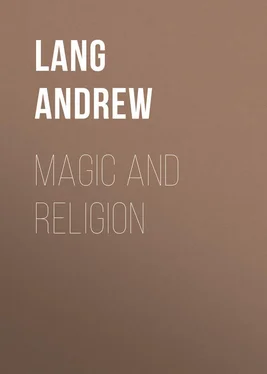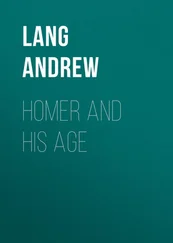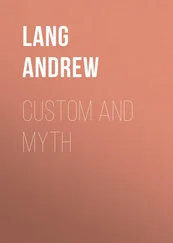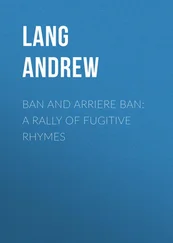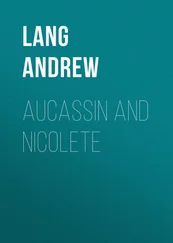Andrew Lang - Magic and Religion
Здесь есть возможность читать онлайн «Andrew Lang - Magic and Religion» — ознакомительный отрывок электронной книги совершенно бесплатно, а после прочтения отрывка купить полную версию. В некоторых случаях можно слушать аудио, скачать через торрент в формате fb2 и присутствует краткое содержание. Жанр: foreign_antique, foreign_prose, на английском языке. Описание произведения, (предисловие) а так же отзывы посетителей доступны на портале библиотеки ЛибКат.
- Название:Magic and Religion
- Автор:
- Жанр:
- Год:неизвестен
- ISBN:нет данных
- Рейтинг книги:4 / 5. Голосов: 1
-
Избранное:Добавить в избранное
- Отзывы:
-
Ваша оценка:
- 80
- 1
- 2
- 3
- 4
- 5
Magic and Religion: краткое содержание, описание и аннотация
Предлагаем к чтению аннотацию, описание, краткое содержание или предисловие (зависит от того, что написал сам автор книги «Magic and Religion»). Если вы не нашли необходимую информацию о книге — напишите в комментариях, мы постараемся отыскать её.
Magic and Religion — читать онлайн ознакомительный отрывок
Ниже представлен текст книги, разбитый по страницам. Система сохранения места последней прочитанной страницы, позволяет с удобством читать онлайн бесплатно книгу «Magic and Religion», без необходимости каждый раз заново искать на чём Вы остановились. Поставьте закладку, и сможете в любой момент перейти на страницу, на которой закончили чтение.
Интервал:
Закладка:
The essential point of Mr. Manning's report, injured as it is by his impossible terminology, is the extreme secrecy maintained on these points by his savage informants. They used to believe that the world would perish if the women heard of their dogmas. Thus a man said to Mr. Howitt (whose competence as a witness is indisputable): 'If a woman were to hear these things, or hear what we tell the boys, I would kill her.' 42 42 J. A. I . vol. xiv. p. 310.
One of Mr. Manning's witnesses slunk 'into a wooden fireplace,' whence he whispered his beliefs. He had previously examined doors and windows in search of listeners. A man who reported these creeds would, if they became divulged among the women, be obliged to kill his wife.
If the religious ideas were borrowed from missionaries, the women would know them as well as the men. They would not be reserved for initiates at the mysteries, through which Mr. Howitt derived his most esoteric knowledge of creeds, whereof, in 1881, he was absolutely ignorant. 43 43 See his and Mr. Fison's Kamilaroi and Kurnai , 1881.
If the beliefs were of missionary origin, the young men, not the old men, would know most about Baiame. For similar beliefs in North-West Central Queensland I may cite Mr. Both. 44 44 North-West Central Queensland Aborigines , pp. 14, 36, 116, 153, 158, 165.
The being Mulkari is described by Mr. Both as I a benevolent, omnipresent, supernatural being; anything incomprehensible.' 'Mulkari is the supernatural power who makes everything which the blacks cannot otherwise account for; he is a good, beneficent person, and never kills any one.' His home is in the skies. He was also a medicine-man, has the usual low myths about him, and invented magic. So writes Dr. Both, who knows the local Pitta Pitta language – and is not a missionary. Dr. Both is pursuing his researches, and his remarks are only cited provisionally, awaiting confirmation.
Sometimes European observers do not see the trend of their own reports. In 1845 Mr. Eyre described 'the origin of creation 'as narrated to him by Australian blacks on the Murring River. A being, Noorele, with three unbegotten sons, lives up among the clouds. He is 'all powerful and of benevolent nature. He made the earth, trees, water, &c. He receives the souls ( ladko = shades, umbra ) of the natives, who join him in the skies and will never die again.' Yet Mr. Eyre adds: 'A Deity, a Great First Cause, can hardly be said to be acknowledged.' 45 45 Eyre, vol. ii. pp. 355-357.
What is Noorele if not a 'Great First Cause'?
Among some tribes Bunjil, merely a title of authority, meaning master, lord, headman, is a name of the superior being. Abundance of the mythology of Bunjil, often ludicrous or degrading, the being showing as a supernormal medicine-man, may be found in Mr. Brough Smyth's great collections. 46 46 Aborigines of Victoria.
But no evidence can be better than that of native poetry, which proves a higher aspect of Bunjil.
A Woiworung bard of old made a song which moved an aged singer to tears by 'the melancholy which the words conveyed to him.' It was an 'inspired' song, for the natives, like ourselves, would think Tennyson inspired and Tupper not so. Usually 'the spirits' inspire singers; this song was inspired by Bunjil himself, who '"rushes down" into the heart of the singer,' just as Apollo did of old. It is a dirge of the native race:
We go all!
The bones of all
Are shining white.
In this Dulur land!
The rushing noise
Of Bunjil, our Father,
Sings in my breast,
This breast of mine! 47 47 Arranged in lines from the literal translation, preserving the native idiom. Howitt, J. A. I . vol. xvi. pp. 330, 331.
The missionaries do not inspire these songs. They put them down. 'The white man,' says Mr. Howitt, 'knows little or nothing of the black fellows' songs.' One of Mr. Manning's informants (1845) was angry when asked for the Hymn to Baiame (Boyma). He said that Mr. Manning knew too much already.
I have dwelt specially on Australia, because there, as the natives do not worship ancestral spirits (the names of the dead are tabooed), their superior being cannot have been evolved out of ghost worship. I have expressly avoided the evidence of missionaries, except the early Jesuits, because missionaries are believed by some writers to be biassed on this point, though, in fact, on other points they are copiously cited by anthropologists. As Mr. Tylor finds the saintly and often martyred Jesuits of 1620-1660 worth quoting, I have therefore admitted Father Le Jeune's testimony to the existence of Atahocan before their arrival in America, with Father Brebeuf's Oki, or 'un Oki,' whose anger is feared and who sanctions treaties. It is impossible to me to understand how the savages could borrow from Europeans the beliefs which the Europeans found extant when they arrived. I have not touched the case of Africa. In 'The Making of Religion' (pp. 222-228), I argued against Sir A. B. Ellis's elaborate theory of borrowing a god, in the case of the Tshi-speaking races. I did not know that this exact writer had repudiated his theory, which was also rejected by Miss Mary Kingsley.
As to Australia, in face of the evidence (which settled Mr. Howitt's doubts as to the borrowing of these ideas) can any one bring a native of age and credit who has said that Baiame, under any name, was borrowed from the whites? Mr. Palmer is 'perfectly satisfied' that 'none of these ideas were derived from the whites.' He is speaking of the tribes of the Gulf of Carpentaria, far away indeed from Victoria and New South Wales. There is no greater authority among anthropologists than Waitz, and Waitz rejects the hypothesis that the higher Australian religious beliefs were borrowed from Christians. 48 48 Anthropologie , vi. p. 798.
To sum up, we have proved, by evidence of 1558, 1586, 1612-16, and 1633, that a sort of supreme creative being was known in North America before any missionary influence reached the regions where he prevailed. As to the Australian god Baiame, we have shown out of the mouth of Mr. Tylor's own witness, Mr. Hale, that Baiame preceded the missionaries in the region where literary evidence of his creed first occurs. We have given Mr. Hale's opinion as to the improbability of borrowing. We have left it to Mr. Tylor to find the missionary who, before 1840, translated 'Creator' by the Kamilaroi word 'Baiame' while showing the difficulty – I think the impossibility – of discovering any Kamilaroi philologist before Mr. Threlkeld. And Mr. Threlkeld certainly did not introduce Baiame! We have proved that, contrary to Mr. Tylor's theory of what a missionary can do, Mr. Threlkeld could not introduce his own names for God, Eloi and Jehovah-ka, into Kamilaroi practice. We note the improbability that highly conservative medicine-men would unanimously thrust a European idea into their ancient mysteries. We have observed that by the nature of Mr. Tylor's theory, the hypothetically borrowed divine names and attributes must (if taken over from missionaries) have been well known to the women and children from whom they are concealed under dreadful penalties. We have demonstrated the worthlessness of negative evidence by proving that the facts were discovered, on initiation, by a student (Mr. Howitt), confessedly in the first rank, though he, during many years, had been ignorant of their existence. We show that the ideas of age and paternity, in an object of reverence, are natural and habitual to Australian natives, and stood in no need of being borrowed. We suggest that the absence of prayer to a powerful being is fatal to the theory of borrowing. We show that direct native evidence utterly denies the borrowing of divine names and attributes, and strenuously asserts that before Europeans came to Melbourne (1835) they were revealed in the secret doctrine of ancient initiatory rites. This evidence again removed the doubts which Mr. Howitt had entertained on the point, and Mr. Palmer and Mr. Dawson agree with Mr. Howitt, Mr. Kidley, Mr. Günther, and Mr. Greenway, all experts, all studying the blacks on the spot. In the study, Waitz is of the same opinion. Australian religion is unborrowed.
Читать дальшеИнтервал:
Закладка:
Похожие книги на «Magic and Religion»
Представляем Вашему вниманию похожие книги на «Magic and Religion» списком для выбора. Мы отобрали схожую по названию и смыслу литературу в надежде предоставить читателям больше вариантов отыскать новые, интересные, ещё непрочитанные произведения.
Обсуждение, отзывы о книге «Magic and Religion» и просто собственные мнения читателей. Оставьте ваши комментарии, напишите, что Вы думаете о произведении, его смысле или главных героях. Укажите что конкретно понравилось, а что нет, и почему Вы так считаете.
